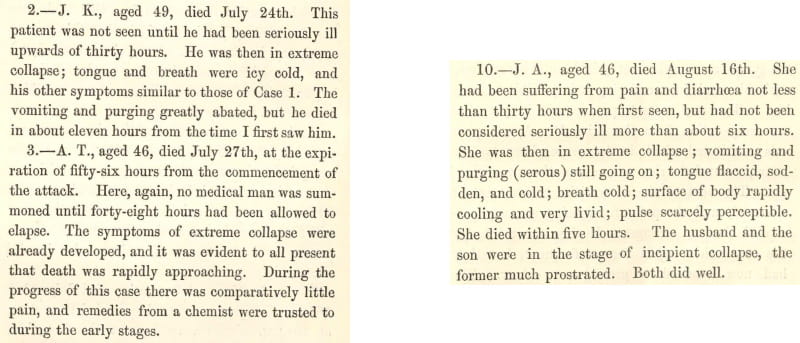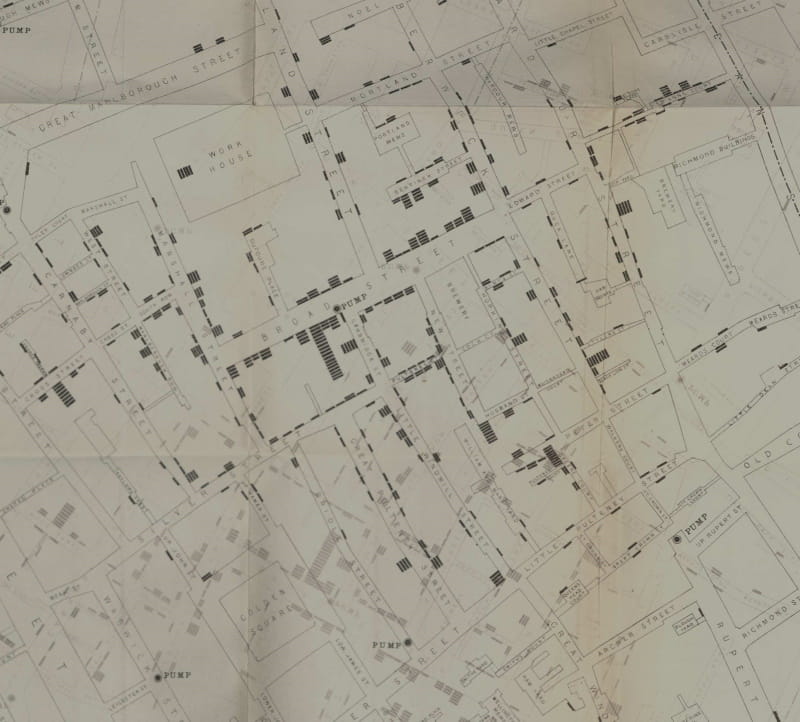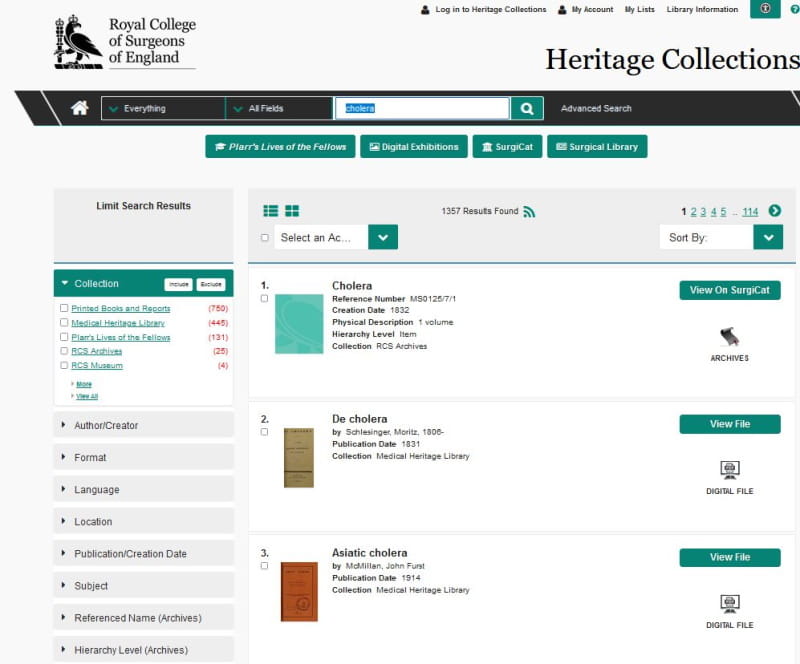History Day 2022: Cholera to Covid - Navigating the Royal College of Surgeons of England catalogue
24 Oct 2022
Susan Isaac
The Royal College of Surgeons of England Library possesses an outstanding library of surgical literature dating from the late 15th century to the present day. The Library supports the learning, teaching, research and clinical activities of the members of the College. In this capacity the collection includes reports and discussions on medical breakthroughs and the responses to medical crises collected since the collection was first formed. Searching the books, pamphlets and reports provides a glimpse into how diseases and injuries were viewed and treated across the centuries and materials. In particular, materials that relate to either the College institutional response or the individual responses of members and fellows to world health developments, can prove an unanticipated wealth of sources for those researching the history of science and technology.
The recent period has shown us the importance of recording how we respond to public health emergencies. Cholera epidemics plagued humanity throughout history. During the 19th century it was extremely prevalent in London, with four major episodes as well as outbreaks in other major cities. As a result the College’s collections have fascinating material on the subject, including contemporary reports and pamphlets published at the time of outbreaks such as Thoughts on cholera by Edwin Hearne, published in 1853. He describes the symptoms and treatments given in 570 cases, weighing up the evidence and detailing some case histories in more detail.
Above: Case studies from Thoughts on Cholera.
At this point it was believed that the disease was transmitted and spread by a ‘bad air’ or ‘miasma’ from rotting organic matter. This thinking dominated official medical and government statements. It wasn’t until 1854 that the physician John Snow made a major contribution to fighting cholera when he was able to demonstrate a link between cholera and contaminated drinking water through his pioneering studies detailed in On the Mode of Communication of Cholera, 2nd ed.
Above: A map from On the Mode of Communication of Cholera.
There is a consistent stream of professional dialogue within the clinical medical and scientific communities. Historical collections reflect this in the material collected over time at the College from around the world. In the past this came in the form of published works in printed pamphlets, journal articles, official reports and books.
Collecting material on worldwide health events now
The first known case of Covid-19 was identified in Wuhan, China, in December 2019. The disease quickly spread worldwide, resulting in the recent and ongoing pandemic. The scientific and publishing communities responded quickly, sharing information and experiences just as their predecessors had. Two of the main differences between, for example the great influenza epidemic in 1918 and Covid was the speed of dissemination as well as the proliferation of formats including the most fast paced digital ones. Personal experiences were published as blogs and webinars. Clinical and scientific research and information was published and shared widely online as open-access articles, including research data, was released comparatively earlier in an effort to push forward thinking about the disease. This material has often been gathered into institutional or subject repositories.
The RCS England COVID Research Group outputs are publically available. This group brought together the COVID-specific projects supported by the College, in order to share ideas, collaborate and support the research activity being carried out. Searching the College’s website allows you to see the immediate response and support offered to members.
The recently formed Recovery Research Group will tackle how the surgical research community will build back after the devastating impact of the pandemic, both in the UK and around the globe. This will, like the COVID group repository, collect digital copies of the outputs of research into a collection that will act as an important resource for future studies of the ongoing impact of the pandemic.
This material, both modern and historical, is a primary rather than secondary source of information, allowing you to get as close as possible to what happened in that time period, reflecting the viewpoint of individual observers and participants.
Using keywords and subject headings to search the Library catalogues
There are two discovery tools to help users retrieve a range of modern and historical content:
- Surgical Library is aimed at College members focusing on modern clinical and online resources.
- Heritage Collections is focused on historical material (books, reports, pamphlets, journals etc.) and the needs of academic research.
Keywords are critical when you are searching a catalogue for a topic, so it is wise to take some time to plan and explore the subject first. Always try to think of synonyms, different spellings or related terminology to use to cover your topic. For example, searching for pandemic will give you 70 results with a strong bias towards COVID-19, whereas a search for epidemic returns 823 results with a much wider range of diseases from plague and smallpox to cholera, typhoid and influenza.
Above: A sample search from Heritage Collections.
Subject headings allow you to find similar information more efficiently. They are a specific word or phrase used to find and organise material by topic. The catalogue record for each item is given the subject terms that describe the content of the item. For example Hearne’s Thoughts on cholera has the subject heading cholera whereas the subject heading used for Snow’s publications is Cholera, transmission.
Narrowing down your search results
Using cholera as a keyword returns 1357 results and there are various ways of narrowing down your search. On the left hand side of the screen, there are a number of options to limit the results.
Collection or Format allow you to include or exclude material based on the criteria shown under the headings. The Medical Heritage Library contains digital files allowing anyone to see the item online immediately. Using these options allows you to identify whether the items are held in the Library or Archives or Museum collections. Plarr’s Lives of the Fellows contains the obituaries of College fellows since 1843 to the present. Looking at these entries would enable you to see articles written on cholera and which fellows worked on research or during outbreaks of the disease, it might also identify if any fellows died from the disease.
Subject lists all the subject headings used in the catalogue records as well as the number of items where that term has been used. This can be a useful way of identifying strengths in the collection and will give you a quick way of finding out the range of material that pertains to your topic.
Searches can also be narrowed down by setting a Date range or selecting the Language the item has been written in.
Whether you are looking for the genesis of public health activism by Snow or trying to build a picture of the fast paced-development of research during the pandemic, the Royal College of Surgeons of England has material waiting to be discovered. We hope this short exploration into navigating our tools has been inspiring. Please contact us if you think we can help further your research aims, and take a look at our guide to services. Further details of all our library collections can be found on our online catalogues: Surgical Library and Heritage Collections.
Susan Isaac, Customer Service Manager




